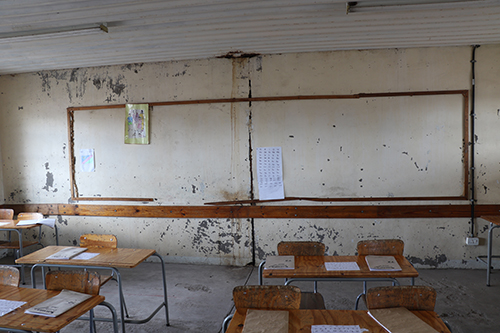Marythar Kambinda
Aron Mushaukwa
KATIMA MULILO – Izimwe Primary School in Kabbe South constituency of the Zambezi region, has been dealing with the challenge of crumbling and insufficient infrastructure, which affect teachers and learners.
According to the school’s acting principal Michael Likando, since 2009 when they received an additional school block, and were informed that more blocks would be built at a later stage, nothing has been done.
“We were just given tents as the learners used to be taught under the tree,” he said.
He further explained that the tents are not stable and usually fall, and at times blown away when there is strong wind as well as when it rains. He added that the existing permanent structures are also in a bad state.
“This is hampering the number of learners at the school as grade 4 to 7 enrolment is very low. Most parents are transferring their children to other schools due to poor and lack of permanent buildings,” said Likando.
According to the vice chairperson of the school board Lunza Mwanamwali, another challenge is that teachers are confined to their classes as there is no administrative block, while the principal and the school secretary have to make use of the storeroom.
Mwanamwali further stated that it was only through community support that they were able to build a temporary mud structure to accommodate learners for grades 4 and 5, while grade 6 learners are being taught under a tent.
The situation has worsened during the current rainy season as the roof of the mud structure was damaged. As a result, learners and their books are now always exposed to raindrops. He said writing on the chalkboard has become an impossible task when it is raining as the water runs down the board.
“Learners taught in tents tend to lose focus during lessons as they are disturbed by animals, people or cars that pass by since their school is not fenced,” said Mwanamwali.
Calvin Mulalelo, a parent and member of the school board could not hide his disappointment in the condition of the school. “This problem is unacceptable and worrisome for us as parents to see our children suffering under such conditions, as our houses are far better than the structures at the school.
“We as parents are simply asking the ministry of education to come to the children’s rescue. If this continues, I do not think that parents will continue bringing their children here,” he added.
Some of the learners at the school narrated their daily ordeals. Violet Simasiku, a grade 6 learner stated that whenever it is windy, the tent is always blown away and at times falls on the learners.
“Apart from that, we always get wet including our stationary whenever it starts raining. We feel neglected and hope the government will do something for us,” she stated.
Another grade 7 learner, Michael Sikopo also narrated his ordeal at the school, and his experience over the years.
“When I was in grade 4, stones from the wall would always start falling and hit us, as well as dust from the ground which always made us sick. We would normally go back home after school dirty. We would really appreciate it if the government attends to our cry,” he said.
Contacted for comment, Zambezi education director Josty Kawana stated that he is not aware of the situation at Izimwe Primary School. He, however, stated that it is not a surprise as the region is battling with dilapidated infrastructure and a lack of classrooms.
“In Katima circuit instance, we agreed to build two more schools. The two schools are there but, does that arrest the problem of lack of space? No,” stated Kawana.
“Some of these structures were built way back and we cannot expect them to remain the same, the population also continually grows. Hence, to mitigate the effect of learners not being in schools, whenever the school tell us that ‘we have run out of space’, we give them tents as a temporary solution, while we are planning to ensure that we construct additional classrooms,’’ said Kawana.
He further explained that the region has already started creating a database of schools that need renovation.
“Through the regional council, very soon a team is going to be sent to go out to schools… to check the status of our classrooms, so that we can at least know where we can start, but some have been receiving our attention.
“Our thinking was that we work on a certain number of schools every year. We have about 107 government schools in the region, and I want to believe, maybe 80% of these schools will need renovation. So the approach is that as funds are available, we will be looking at the schools with critical needs and we will try to address those needs,” assured Kawana.



